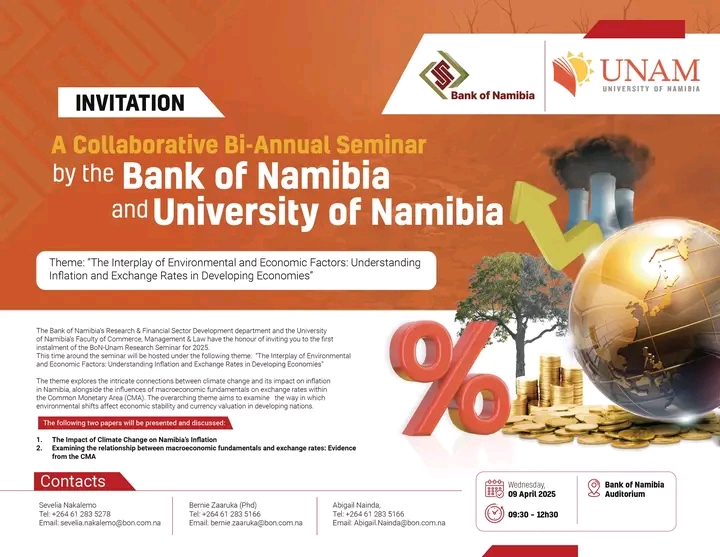Bank of Namibia and UNAM Launch Research Seminar on Environment-Economy Nexus. The Bank of Namibia (BoN), in partnership with the University of Namibia (UNAM), officially opened the 2025 Bi-Annual Research Seminar today, placing a spotlight on the critical link between environmental and economic factors in developing economies.
Held at the Bank of Namibia headquarters in Windhoek, the seminar welcomed participants from academia, policy institutions, and the financial sector. Themed “The Interplay of Environmental and Economic Factors: Understanding Inflation and Exchange Rates in Developing Economies,” the session aimed to foster academic engagement and evidence-based insights on how shifting environmental dynamics influence macroeconomic stability.
Two research papers formed the core of the programme. The first, titled “The Impact of Climate Change on Namibia’s Inflation,” examined how recurring climate-related shocks such as droughts and extreme temperatures influence food prices, energy costs, and ultimately inflation trends in the country.
The second paper, “Examining the Relationship Between Macroeconomic Fundamentals and Exchange Rates: Evidence from the Common Monetary Area (CMA),” delved into how core macroeconomic indicators—such as interest rates, trade balances, and fiscal performance—interact with exchange rate movements within the region.
BoN and UNAM emphasized that this collaboration serves not only to inform policy but also to promote research that addresses the unique challenges faced by Southern African economies. Participants engaged in lively discussions, raising questions about the evolving role of central banks in a climate-conscious world.
The Bi-Annual Research Seminar is part of a broader effort to bridge the gap between research and policymaking. Future seminars are expected to continue exploring topical issues that shape Namibia’s economic outlook.
Join 'Namibia Today' WhatsApp Channel
Get the breaking news in Namibia — direct to your WhatsApp.
CLICK HERE TO JOIN






